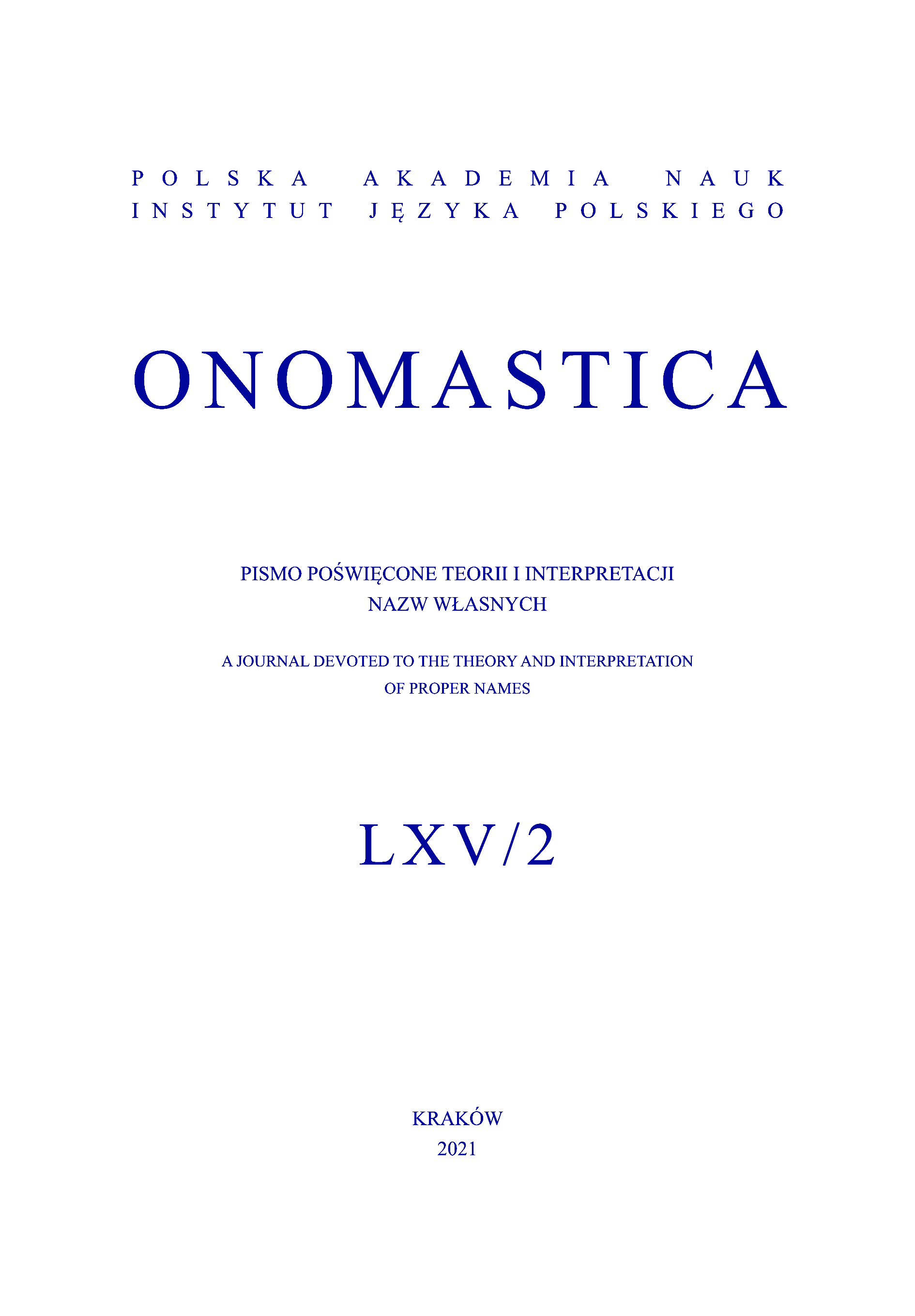Streszczenie
The text deals with the problem of multiculturalism as a concept which functions in social sciences and humanities; it also functions in onomastic research and in the theory of onomastics. The author in her reflection refers to the recently published monograph “Names and Naming. Multicultural Aspects” edited by O. Felecan and A. Bugheşiu (Palgrave Macmillan 2021, pp. 490). In the first part of the article, the author briefly explains the most important concepts related to this issue, including: globalization, glocalization, transethnicity, cultural hybridity. She draws attention to the changes in their understanding in contemporary humanities and social sciences. She presents the most important assumptions of the monograph and the possibilities of including the important concept of multiculturalism into onomastic research carried out all over the world. In the described studies, proper names become an important determinant of individual and group/ethnic identity. The second part of the article presents detailed concepts and research approaches presented in the volume, concerning e.g. proper names in the USA, Russia, Kenya, Zimbabwe and Nigeria. The third part discusses the texts of Polish authors, with particular emphasis on Professor Barbara Czopek- ‑Kopciuch’s (1952‒2020) “Multiculturalism in Polish Toponymy”, which is her last onomastic text. In conclusion, the author pays attention to the application of the notion of multiculturalism in empirical research and in theoretical reflection in onomastics. She stresses the necessity of interdisciplinary research in this field.
Bibliografia
Biernacka-Ligięza, I. (2013). Glokalizacja — byt wyobrażony czy realna potrzeba? [Glocalisation — an imagined entity or a real need?] W: K. Minkner i L. Rubisz (red.), Antynomie polityczności. Artykuły, eseje i szkice dedykowane Profesor Barbarze Goli [Antinomies of Politics. Articles, Essays and Sketches Dedicated to Professor Barbara Gola] (s. 163‒170). Opole: Wydawnictwo UO.
Deja, K. (2015). Transkulturowość: Od koncepcji Wolfganga Welscha do transkulturowej historii literatury [Transculturality: from the idea of Wolfgang Welsch to transcultural literary history]. Wielogłos. Pismo Wydziału Polonistyki UJ, 4(26), 87–107.
Felecan, O. i Bugheşiu, A. (red.). (2021). Names and Naming. Multicultural Aspects. London: Palgrave Macmillan.
Gąsior, M. (2019). Namysł nad kulturą w kontekście transnarodowości [A reflection on culture in the context of transnationalism]. Studia Migracyjne — Przegląd Polonijny, 2(172), 305‒318.
Hałas, E. (2011). Refleksyjność jako zasada i problem teorii społecznej [Reflexivity as a principle and problem in social theory]. Zagadnienia Naukoznawstwa, 47/2(188), 191‒202.
Hannerz, U. (2006). Powiązania transnarodowe. Kultura, ludzie, miejsca [Transnational Connections: Culture, People, Places]. Przeł. K. Franek. Kraków: Wydawnictwo UJ.
Krzysztofek, K. (2003). Pogranicza i multikulturalizm w rozszerzonej Unii [Frontiers and multi-culturalizm in the enlarged Union]. Studia Europejskie, 1, 77‒94.
Lewowicki, T. (2015). Wielokulturowość i globalizacja a strategie edukacji międzykulturowej [Multiculturalism, globalisation and the strategies of intercultural education]. Pogranicze. Studia Społeczne, 25, 13‒24.
Lubaś, M. (2006). Procesy globalizacji a problemy badawcze antropologii społeczno-kulturowej [Globalisation processes and the research problems of socio-cultural anthropology]. W: A. Bukowski, М. Lubaś i J. Nowak (red.), Zarządzanie przestrzenią. Globalizacja, etniczność, władza [Space Management: Globalisation, Ethnicity, Power] (s. 23–48). Kraków: Wydawnictwo UJ.
Pasamonik, B. (2012). Migracje i wielokulturowość społeczeństw europejskich: Problem integracji społeczno-kulturowej [Migration and multiculturalism in European societies: The problem of socio-cultural integration]. W: A. Firkowska-Mankiewicz, T. Kanash i E. Tarkowska (red.), Krótkie wykłady z socjologii: Przegląd problemów i metod. Podręcznik akademicki [Short Lectures in Sociology: A review of problems and methods. An academic textbook] (t. I, s. 273‒292). Warszawa: Wydawnictwo APS.
Pasamonik, B. (2013). Globalizacja kultury czy glokalizacja kultur? [Globalisation of culture or glocalisation of cultures?]. W: A. Firkowska-Mankiewicz, T. Kanash i E. Tarkowska (red.), Krótkie wykłady z socjologii. Kategorie, problemy, subdyscypliny [Short Lectures in Sociology: Categories, problems, subdisciplines] (t. II, s. 117‒138). Warszawa: Wydawnictwo APS.
Polakowski, M. (2016). Multikulturalizm i jego wpływ na bezpieczeństwo demokracji liberalnej [Multiculturalism and its impact on the security of liberal democracy]. Społeczeństwo. Edukacja. Język, 4, 45‒52.
Rutkiewicz-Hanczewska, M. (2013). Genologia onimiczna. Nazwa własna w płaszczyźnie motywacyjno- komunikatywnej [Onymic Genology. The proper name in the motivational and communicative plane]. Poznań: Wydawnictwo Poznańskie.
Sztompka, P. (2021). Socjologia. Wykłady o społeczeństwie [Sociology. Lectures on Society]. Kraków: Znak.
Urwanowicz-Rojecka, E. (2013). Globalizacja jako organizacja różnorodności. Kulturowa koncepcja globalizacji Ulfa Hannerza a polska rzeczywistość społeczno-kulturowa. [Globalisation as an organisation of diversity. Ulf Hannerz’s cultural concept of globalisation and the Polish sociocultural reality]. Pogranicze. Studia Społeczne, 22, 91‒102.


